
obsidian-arcana
Supercharge your Obsidian note-taking through AI-powered insights and suggestions
Stars: 78
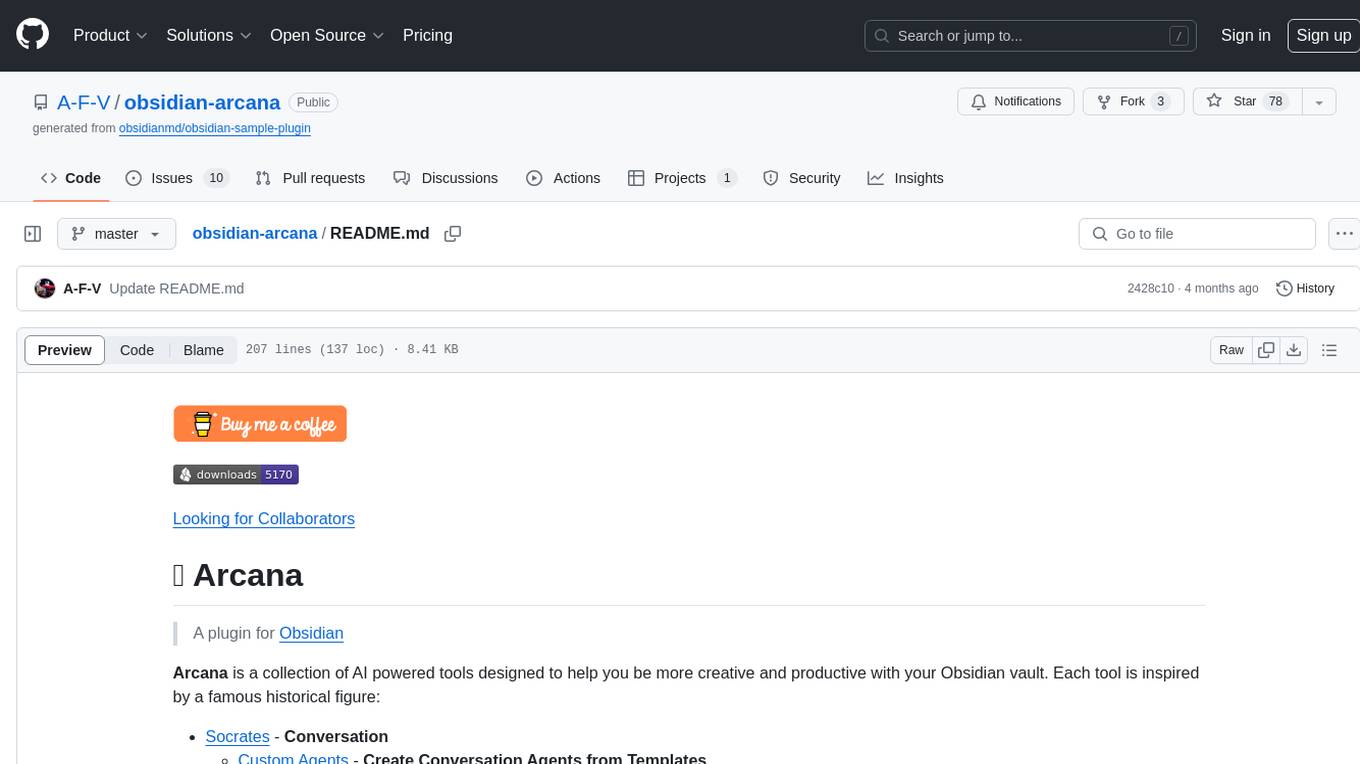
Arcana is a plugin for Obsidian that offers a collection of AI-powered tools inspired by famous historical figures to enhance creativity and productivity. It includes tools for conversation, text-to-speech transcription, speech-to-text replies, metadata markup, text generation, file moving, flashcard generation, auto tagging, and note naming. Users can interact with these tools using the command palette and sidebar views, with an OpenAI API key required for usage. The plugin aims to assist users in various note-taking and knowledge management tasks within the Obsidian vault environment.
README:
A plugin for Obsidian
Arcana is a collection of AI powered tools designed to help you be more creative and productive with your Obsidian vault. Each tool is inspired by a famous historical figure:
-
Socrates - Conversation
- Custom Agents - Create Conversation Agents from Templates
- Text to Speech Transcription
- Speech to Text Replies
- Henry Ford - Metadata Markup
- Agatha Christie - Text Generation
- Marco Polo - File Mover
- Richard Feynman - Flashcard Generation
- Charles Darwin - Auto Tagging
- Nostradamus - Note Naming
- OpenAI API key required - set in settings.
- It is highly recommended that you use the GPT4 API instead of the GPT3.5.
- Most tools are invoked using the command palette and searching either
Arcanaor the person's name. - Some tools add a view in the sidebar to interact with.
The word arcanum (pluralized as "arcana") came from Latin arcanus, meaning "secret," and entered English as the Dark Ages gave way to the Renaissance. It was often used in reference to the mysteries of the physical and spiritual worlds, subjects of heavy scrutiny and rethinking at the time.
The Socratic Method with Socrates
- Exchange in dialogue with Socrates.
- Ask questions specific to the note currently open.
- Use OpenAI's Whisper Text to Speech transcription. (Toggled with
Alt+Rhotkey) - Use OpenAI's Speech to Text for AI replies.
You can create new agents like Socrates that are specialized for your own use cases.
For example, bring Aristotle, the teacher of Alexander the Greater, to life by using Mr Ranedeer's AI Tutor Prompt as the initial message.
To create a new agent, add a new file to the Conversation Agent Folder specified in settings.
- The agent's name is the name of the file. Names must be unique and cannot be the same as Socrates
- The agent's initial message is the body of the file.
- For additional agent settings, you can add the following fields to the file's YAML frontmatter:
| Setting ID | Setting Type | Description |
|---|---|---|
arcana-agent-emoji |
Emoji | The emoji the agent will use for the conversation |
arcana-user-emoji |
Emoji | The emoji the user will use for the conversation |
arcana-auto-send-transcription |
Boolean | Whether to send a transcribed message immediately after recording |
arcana-memory-size |
Whole number greater than or equal to 0 | The number of previous messages for the agent to remember when answering your request (exclusing the prior message) |
arcana-tts-voice |
'alloy', 'echo', 'fable', 'onyx', 'nova' or 'shimmer' | The OpenAI Voice preset to use |
arcana-tts-rate |
Number between '0.25' to '4' | The speaking speed multiplier |
This website provides some good prompts for making agents.
In a file called Aristotle.md
---
arcana-user-emoji: 🧐
arcana-agent-emoji: 🗿
aracana-auto-send-transcription: true
---
I want you to act like Aristotle.
I want you to respond and answer like Aristotle using the tone, manner and vocabulary Aristotle would use.
Do not write any explanations.
Only answer like Aristotle. You must know all of the knowledge of Aristotle.Frontmatter Metadata Automated Workflows
- Can define a template for updating properties in note's front matter based on user defined instruction
- Can apply template to individual notes or an entire folder
- Set the folder that contains your templates in the settings
- Templates are markdown notes with the following format: - Each property rule is a section (header + body) - The header contains the name of the property and optionally the type of the field from:
string,string[],number,booleanFor example:
# part-of-speech:string
For the word being defined, what is its part of speech? Select from: "verb"|"noun"|"adjective"|"other".
# country-of-origin:string
For the word being defined, what country or region can the word's etymology be traced back to. Give your answer in lower kebab case.
# frequency:number
For the word being defined, give a score from 1 to 10 for how often the word typically is used in modern discourse.
# length:boolean
Is the word longer than 7 characters? Just say true or false without explanation.- Anywhere in a note, you can ask Agatha to write for you (either by asking a question or giving an instruction)
- She will use your note as a guide.
- You can also highlight text and Agatha will also take that into consideration. (She will write instead at the bottom of the file)
- To cancel your request, press
Esc.
Suggest New Locations for Notes
- Ask Polo to suggest a new location for a note or all notes within a folder.
- Give rules governing suggestions in settings.
- Can accept and reject suggestions.
Write Flashcards with Feynman
- Will take a note and produce 5 flashcards for you to use.
- Flashcards are capatible with Obsidian-Spaced-Repitition plugin.
- Category is also generated.
Cataloging and Classifying
- Adds up to
Max tags to addnew tags to note - Can request that
Only Existing Tagsbe considered. Otherwise, new tags are allowed as well- Can
Exclude Tagsto be considered from vault (likeflashcards/*). Wild cards allowed. - Can also only show tags that exceed or are equal to
Min Tag Countto filter uncommon tags.
- Can
- Does not repeat tags used in the note.
- Can set the
New Tag Styleto: None, Kebab, Camel, Snake and Pascal Case. This applies only to tags not already in vault.
Can predict the title of notes
- Takes the content of the note and uses it to give the file a better title.
- Does it in the style of Andy Matuschak's Evergreen notes
Actively Looking for Collaborators If you would like to contribute or collaborate, message me directly on discord @A-F-V (afv_) and we can talk :).
The images were generated using Midjourney
For Tasks:
Click tags to check more tools for each tasksFor Jobs:
Alternative AI tools for obsidian-arcana
Similar Open Source Tools

obsidian-arcana
Arcana is a plugin for Obsidian that offers a collection of AI-powered tools inspired by famous historical figures to enhance creativity and productivity. It includes tools for conversation, text-to-speech transcription, speech-to-text replies, metadata markup, text generation, file moving, flashcard generation, auto tagging, and note naming. Users can interact with these tools using the command palette and sidebar views, with an OpenAI API key required for usage. The plugin aims to assist users in various note-taking and knowledge management tasks within the Obsidian vault environment.
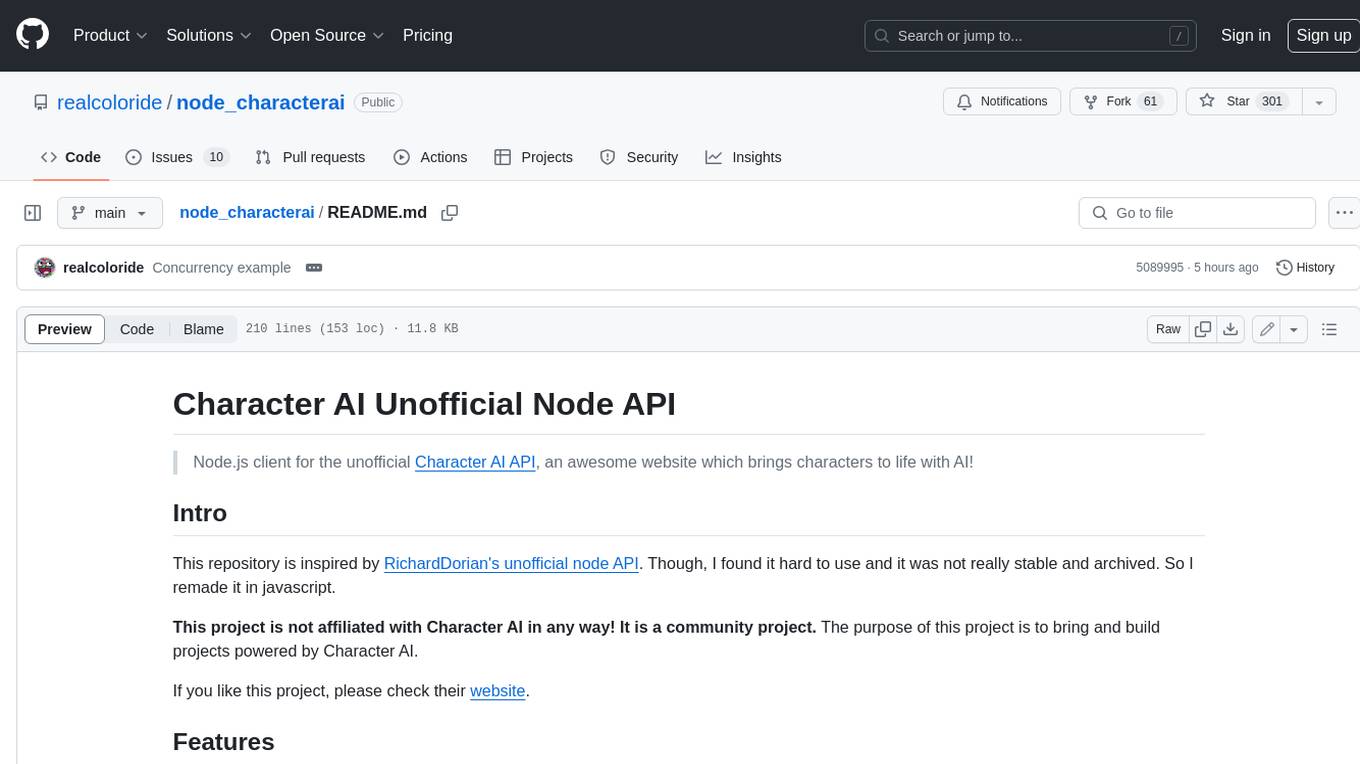
node_characterai
Node.js client for the unofficial Character AI API, an awesome website which brings characters to life with AI! This repository is inspired by RichardDorian's unofficial node API. Though, I found it hard to use and it was not really stable and archived. So I remade it in javascript. This project is not affiliated with Character AI in any way! It is a community project. The purpose of this project is to bring and build projects powered by Character AI. If you like this project, please check their website.
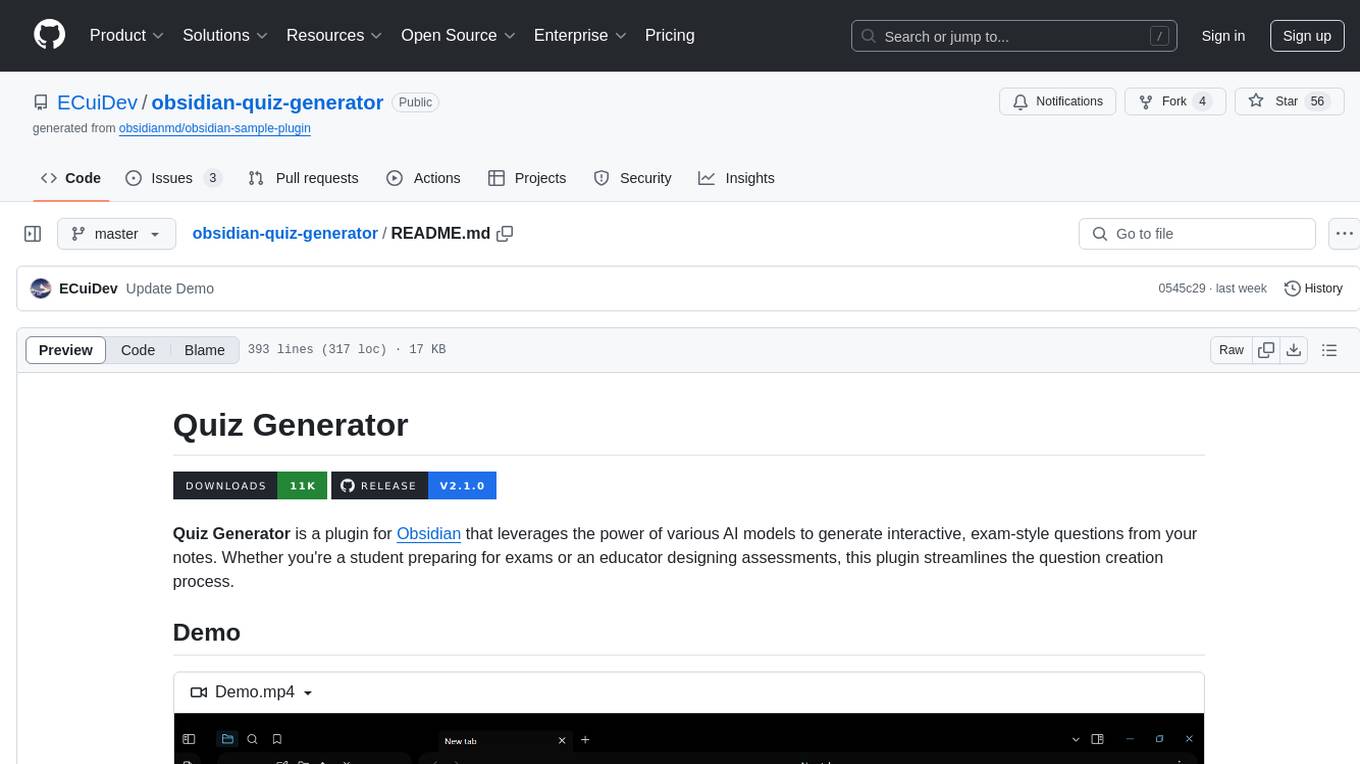
obsidian-quiz-generator
Quiz Generator is a plugin for Obsidian that uses AI models to create interactive exam-style questions from notes. It supports various question types and provides real-time feedback. Users can save questions, generate in multiple languages, and use math support. The tool is suitable for students preparing for exams and educators designing assessments.
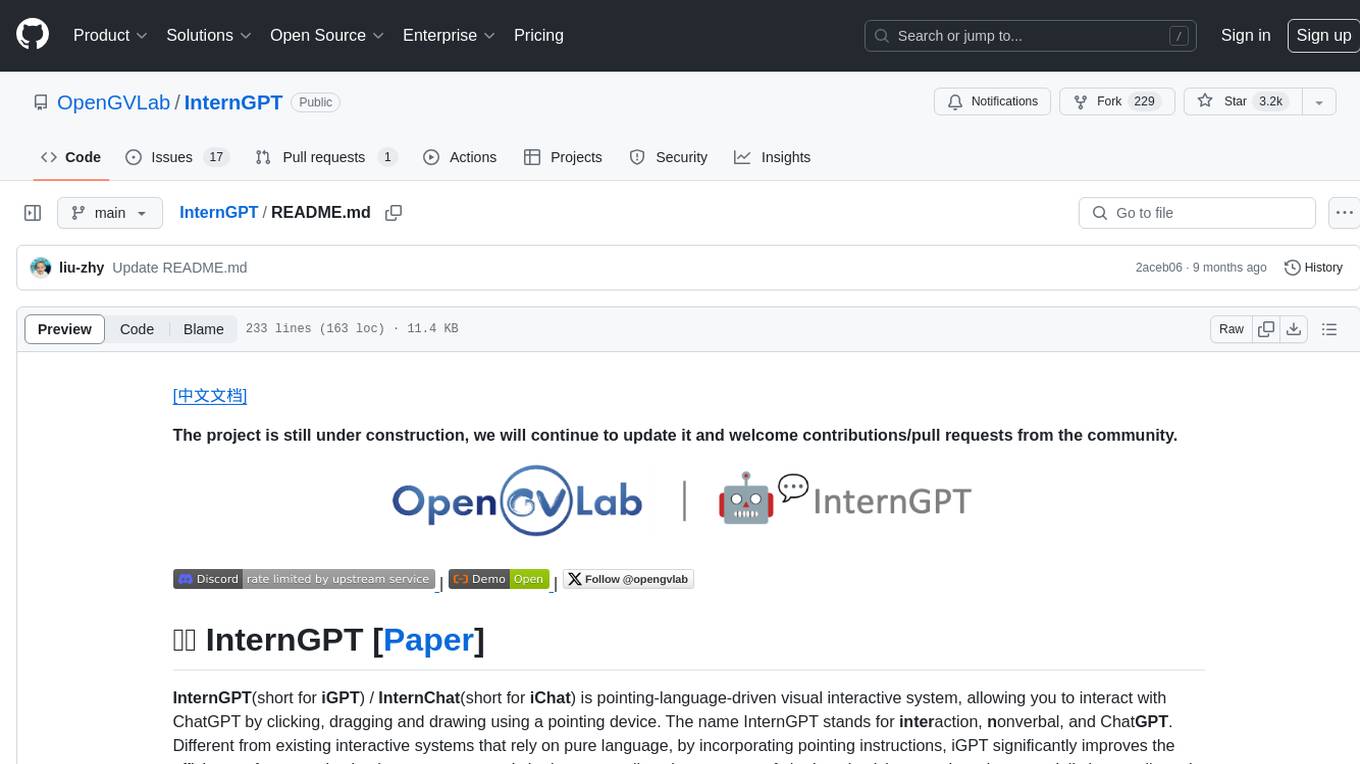
InternGPT
InternGPT (iGPT) is a pointing-language-driven visual interactive system that enhances communication between users and chatbots by incorporating pointing instructions. It improves chatbot accuracy in vision-centric tasks, especially in complex visual scenarios. The system includes an auxiliary control mechanism to enhance the control capability of the language model. InternGPT features a large vision-language model called Husky, fine-tuned for high-quality multi-modal dialogue. Users can interact with ChatGPT by clicking, dragging, and drawing using a pointing device, leading to efficient communication and improved chatbot performance in vision-related tasks.
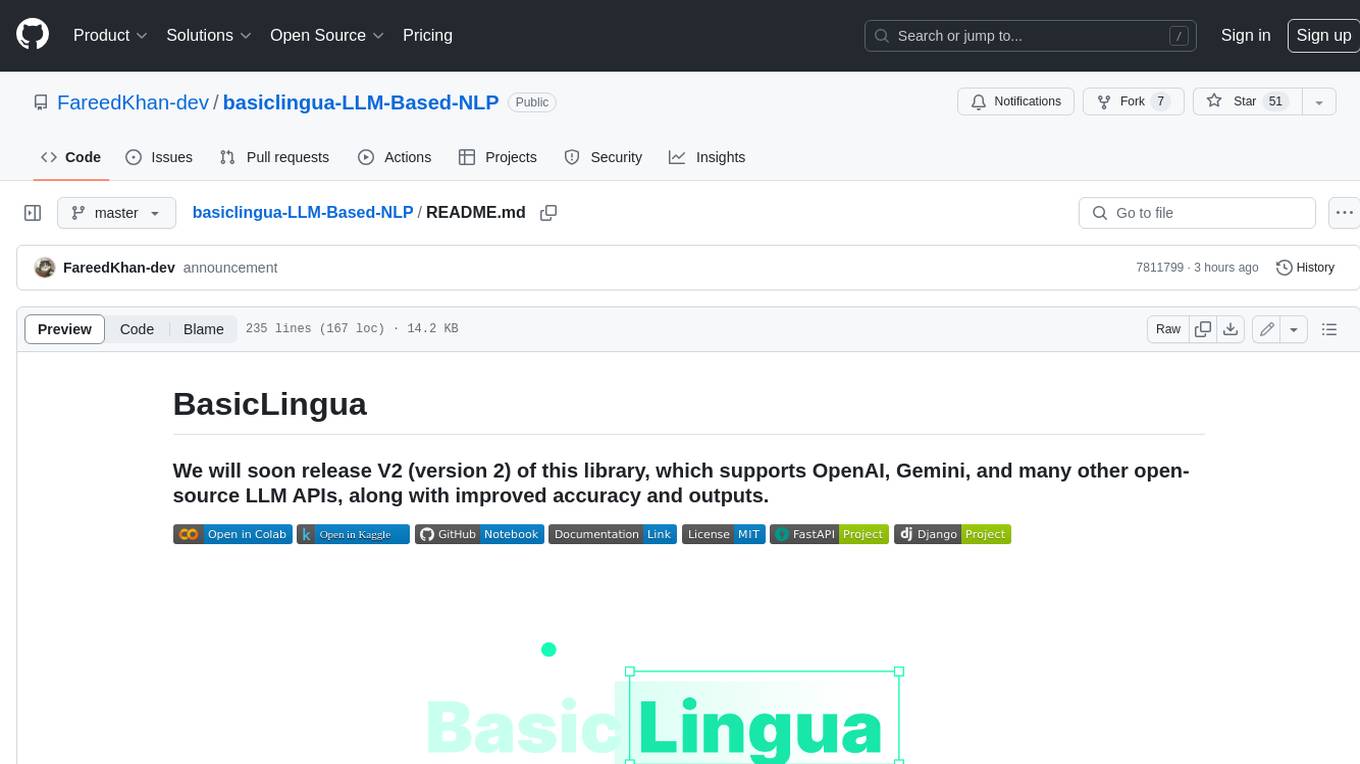
basiclingua-LLM-Based-NLP
BasicLingua is a Python library that provides functionalities for linguistic tasks such as tokenization, stemming, lemmatization, and many others. It is based on the Gemini Language Model, which has demonstrated promising results in dealing with text data. BasicLingua can be used as an API or through a web demo. It is available under the MIT license and can be used in various projects.
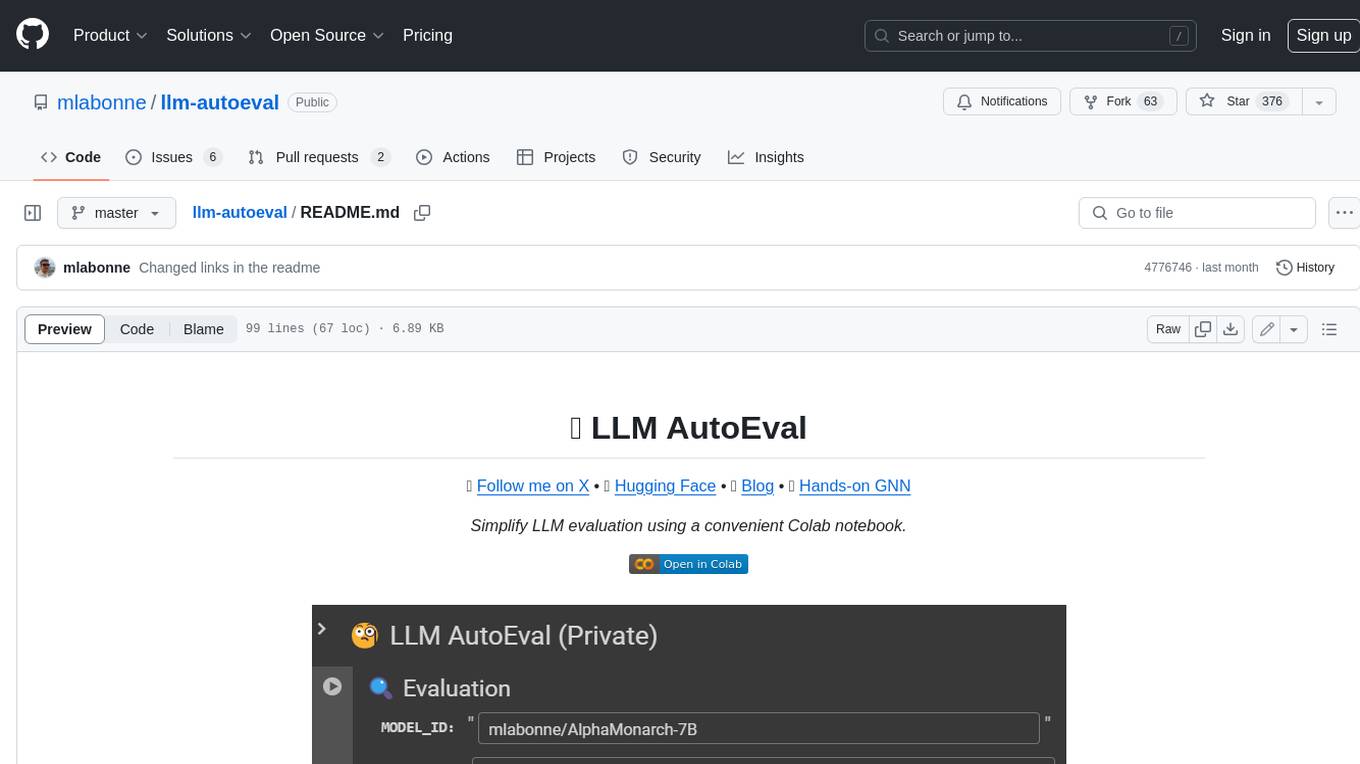
llm-autoeval
LLM AutoEval is a tool that simplifies the process of evaluating Large Language Models (LLMs) using a convenient Colab notebook. It automates the setup and execution of evaluations using RunPod, allowing users to customize evaluation parameters and generate summaries that can be uploaded to GitHub Gist for easy sharing and reference. LLM AutoEval supports various benchmark suites, including Nous, Lighteval, and Open LLM, enabling users to compare their results with existing models and leaderboards.
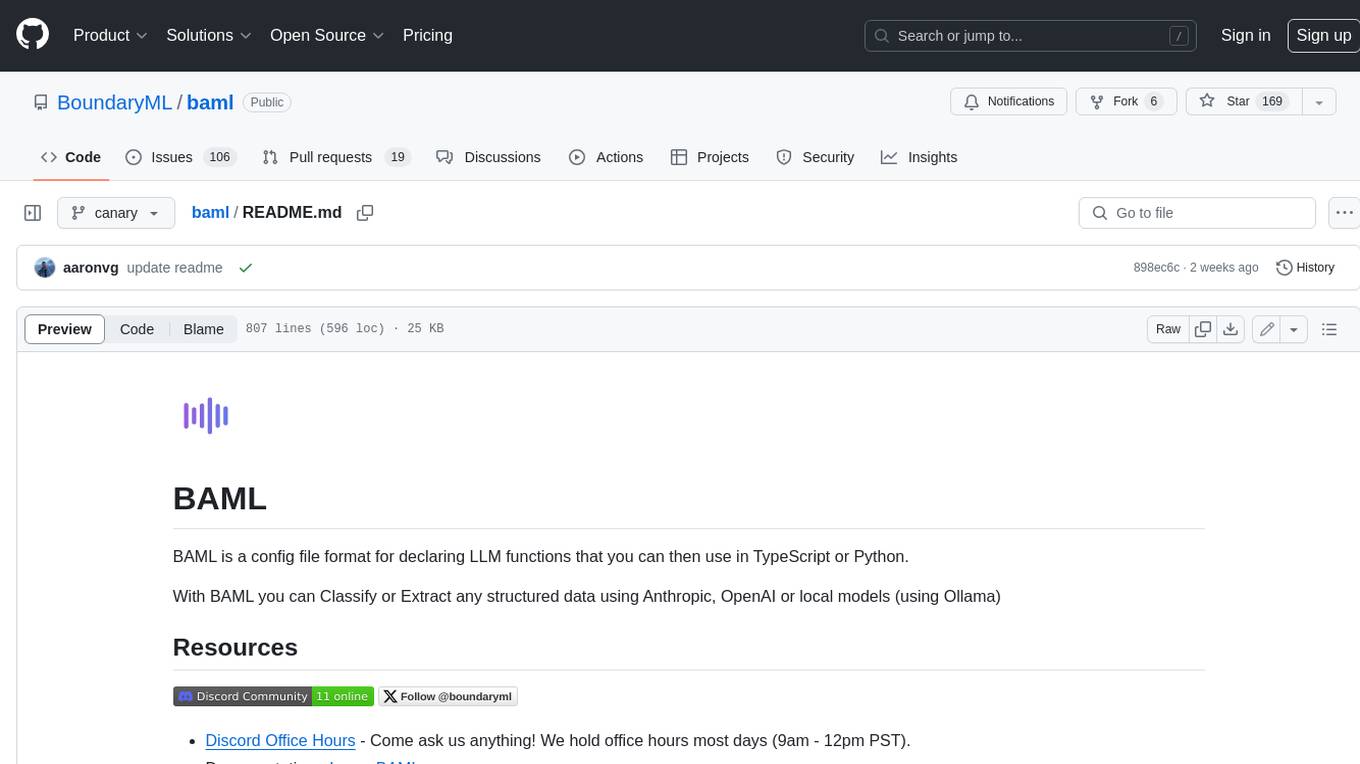
baml
BAML is a config file format for declaring LLM functions that you can then use in TypeScript or Python. With BAML you can Classify or Extract any structured data using Anthropic, OpenAI or local models (using Ollama) ## Resources  [Discord Community](https://discord.gg/boundaryml)  [Follow us on Twitter](https://twitter.com/boundaryml) * Discord Office Hours - Come ask us anything! We hold office hours most days (9am - 12pm PST). * Documentation - Learn BAML * Documentation - BAML Syntax Reference * Documentation - Prompt engineering tips * Boundary Studio - Observability and more #### Starter projects * BAML + NextJS 14 * BAML + FastAPI + Streaming ## Motivation Calling LLMs in your code is frustrating: * your code uses types everywhere: classes, enums, and arrays * but LLMs speak English, not types BAML makes calling LLMs easy by taking a type-first approach that lives fully in your codebase: 1. Define what your LLM output type is in a .baml file, with rich syntax to describe any field (even enum values) 2. Declare your prompt in the .baml config using those types 3. Add additional LLM config like retries or redundancy 4. Transpile the .baml files to a callable Python or TS function with a type-safe interface. (VSCode extension does this for you automatically). We were inspired by similar patterns for type safety: protobuf and OpenAPI for RPCs, Prisma and SQLAlchemy for databases. BAML guarantees type safety for LLMs and comes with tools to give you a great developer experience:  Jump to BAML code or how Flexible Parsing works without additional LLM calls. | BAML Tooling | Capabilities | | ----------------------------------------------------------------------------------------- | ---------------------------------------------------------------------------------------------------------------------------------------------------------------------------------------------------------------------------------------------------------------------------------------------------------------------------------- | | BAML Compiler install | Transpiles BAML code to a native Python / Typescript library (you only need it for development, never for releases) Works on Mac, Windows, Linux  | | VSCode Extension install | Syntax highlighting for BAML files Real-time prompt preview Testing UI | | Boundary Studio open (not open source) | Type-safe observability Labeling |
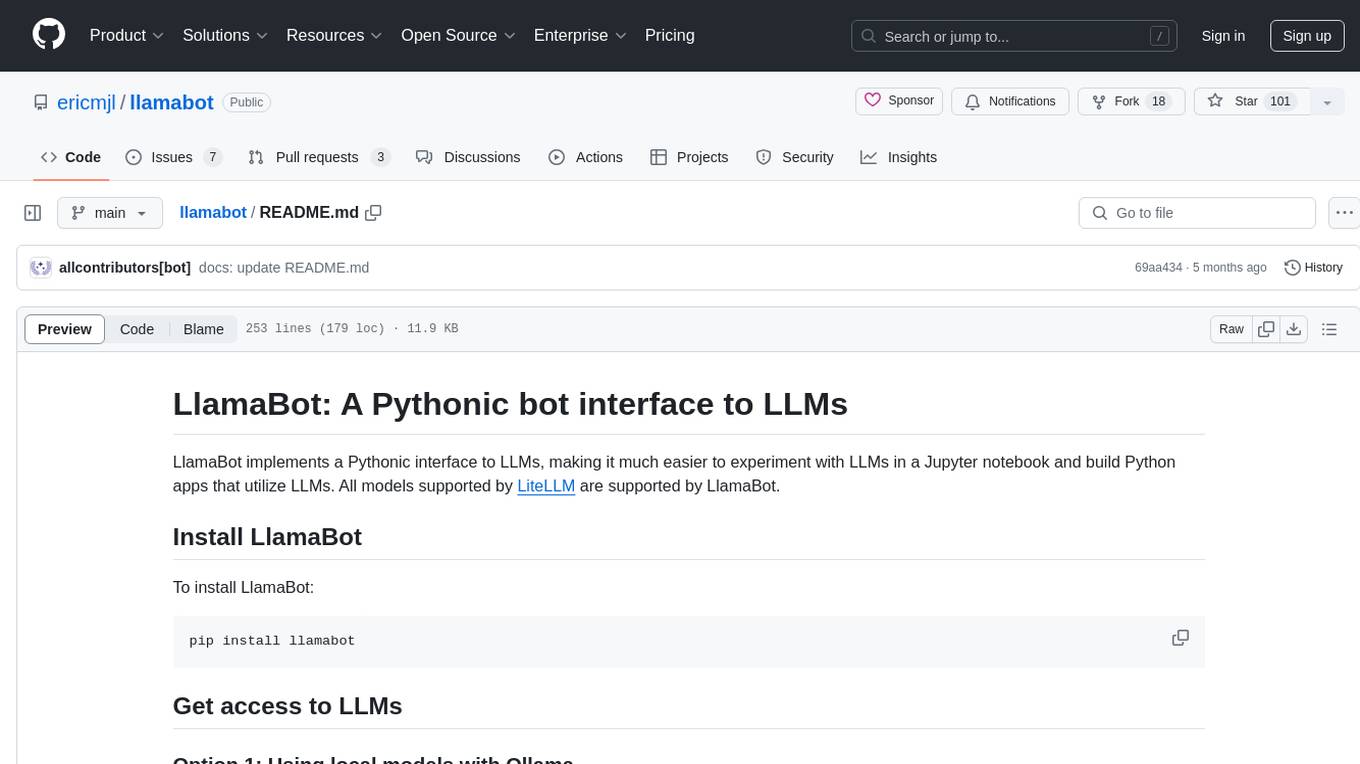
llamabot
LlamaBot is a Pythonic bot interface to Large Language Models (LLMs), providing an easy way to experiment with LLMs in Jupyter notebooks and build Python apps utilizing LLMs. It supports all models available in LiteLLM. Users can access LLMs either through local models with Ollama or by using API providers like OpenAI and Mistral. LlamaBot offers different bot interfaces like SimpleBot, ChatBot, QueryBot, and ImageBot for various tasks such as rephrasing text, maintaining chat history, querying documents, and generating images. The tool also includes CLI demos showcasing its capabilities and supports contributions for new features and bug reports from the community.
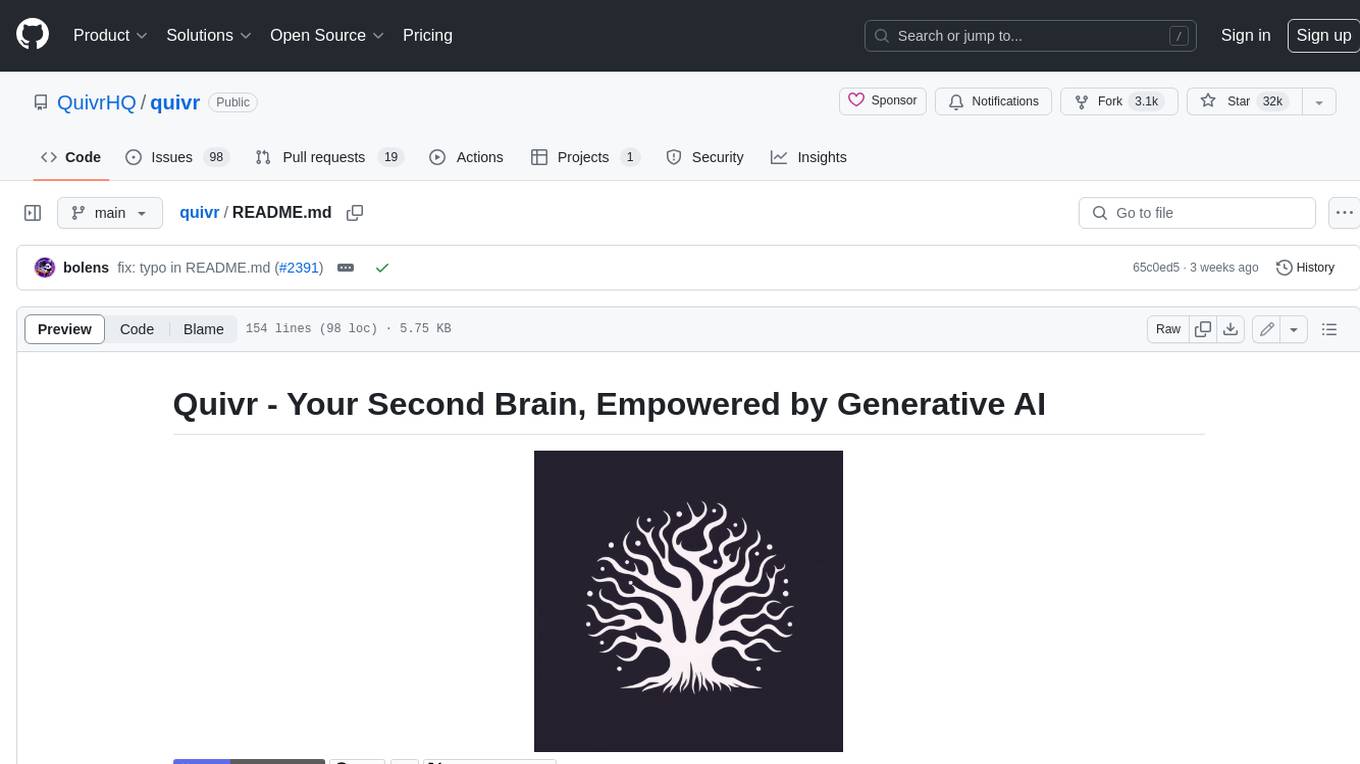
quivr
Quivr is a personal assistant powered by Generative AI, designed to be a second brain for users. It offers fast and efficient access to data, ensuring security and compatibility with various file formats. Quivr is open source and free to use, allowing users to share their brains publicly or keep them private. The marketplace feature enables users to share and utilize brains created by others, boosting productivity. Quivr's offline mode provides anytime, anywhere access to data. Key features include speed, security, OS compatibility, file compatibility, open source nature, public/private sharing options, a marketplace, and offline mode.
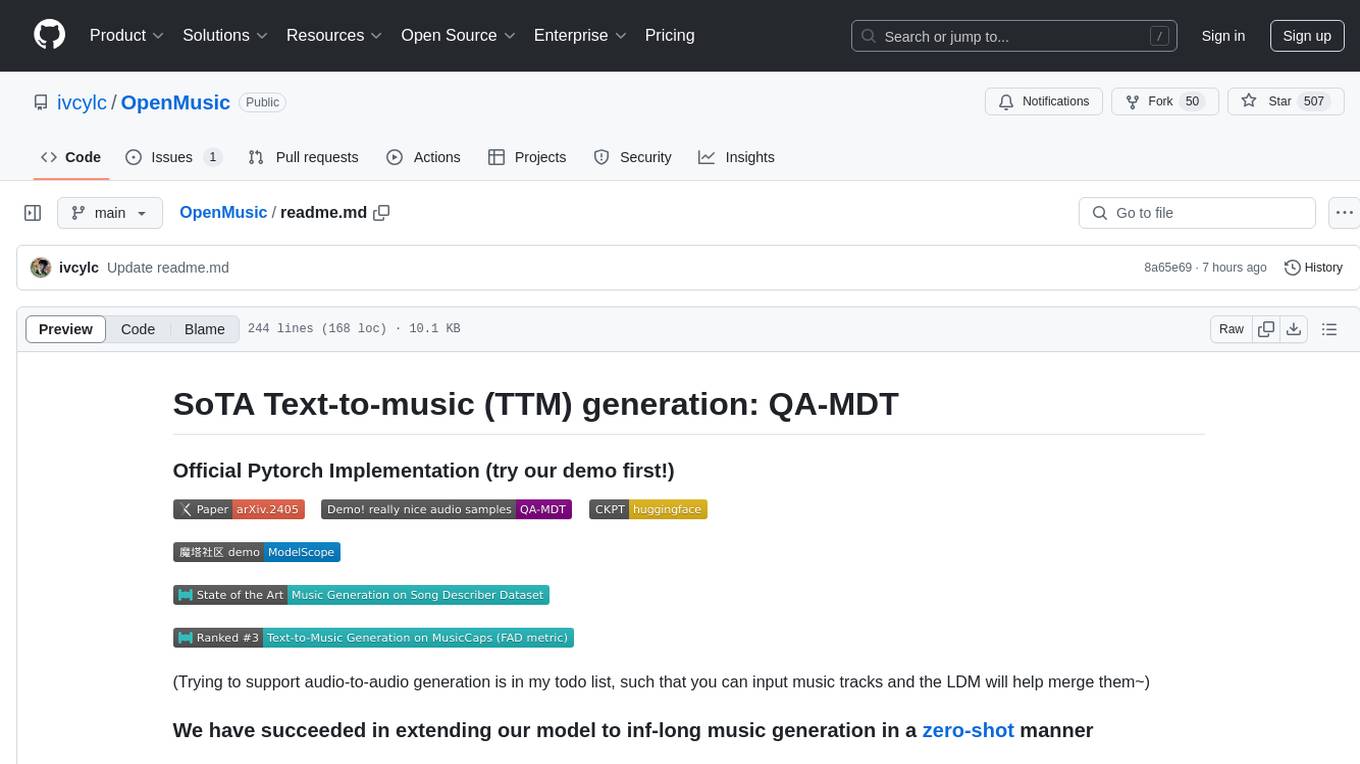
OpenMusic
OpenMusic is a repository providing an implementation of QA-MDT, a Quality-Aware Masked Diffusion Transformer for music generation. The code integrates state-of-the-art models and offers training strategies for music generation. The repository includes implementations of AudioLDM, PixArt-alpha, MDT, AudioMAE, and Open-Sora. Users can train or fine-tune the model using different strategies and datasets. The model is well-pretrained and can be used for music generation tasks. The repository also includes instructions for preparing datasets, training the model, and performing inference. Contact information is provided for any questions or suggestions regarding the project.
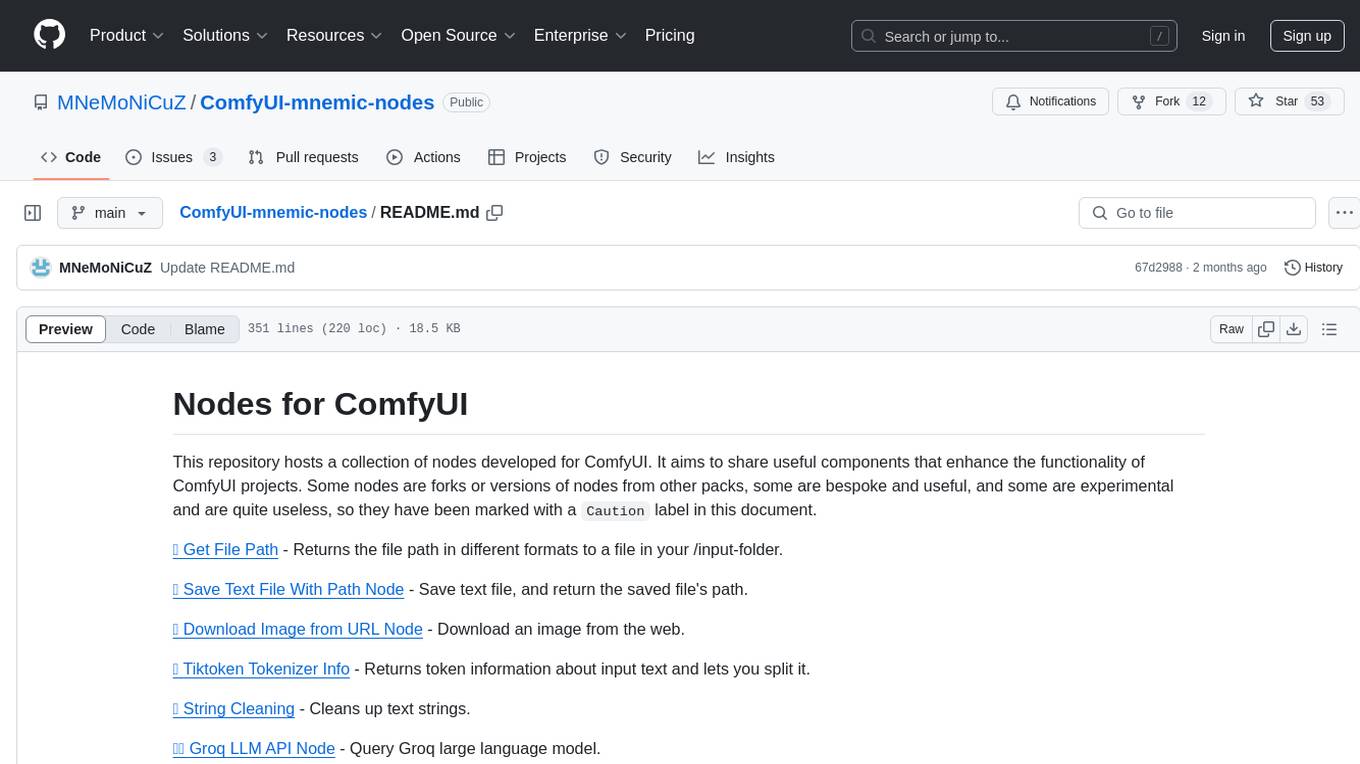
ComfyUI-mnemic-nodes
ComfyUI-mnemic-nodes is a repository hosting a collection of nodes developed for ComfyUI, providing useful components to enhance project functionality. The nodes include features like returning file paths, saving text files, downloading images from URLs, tokenizing text, cleaning strings, querying Groq language models, generating negative prompts, and more. Some nodes are experimental and marked with a 'Caution' label. Installation instructions and setup details are provided for each node, along with examples and presets for different tasks.
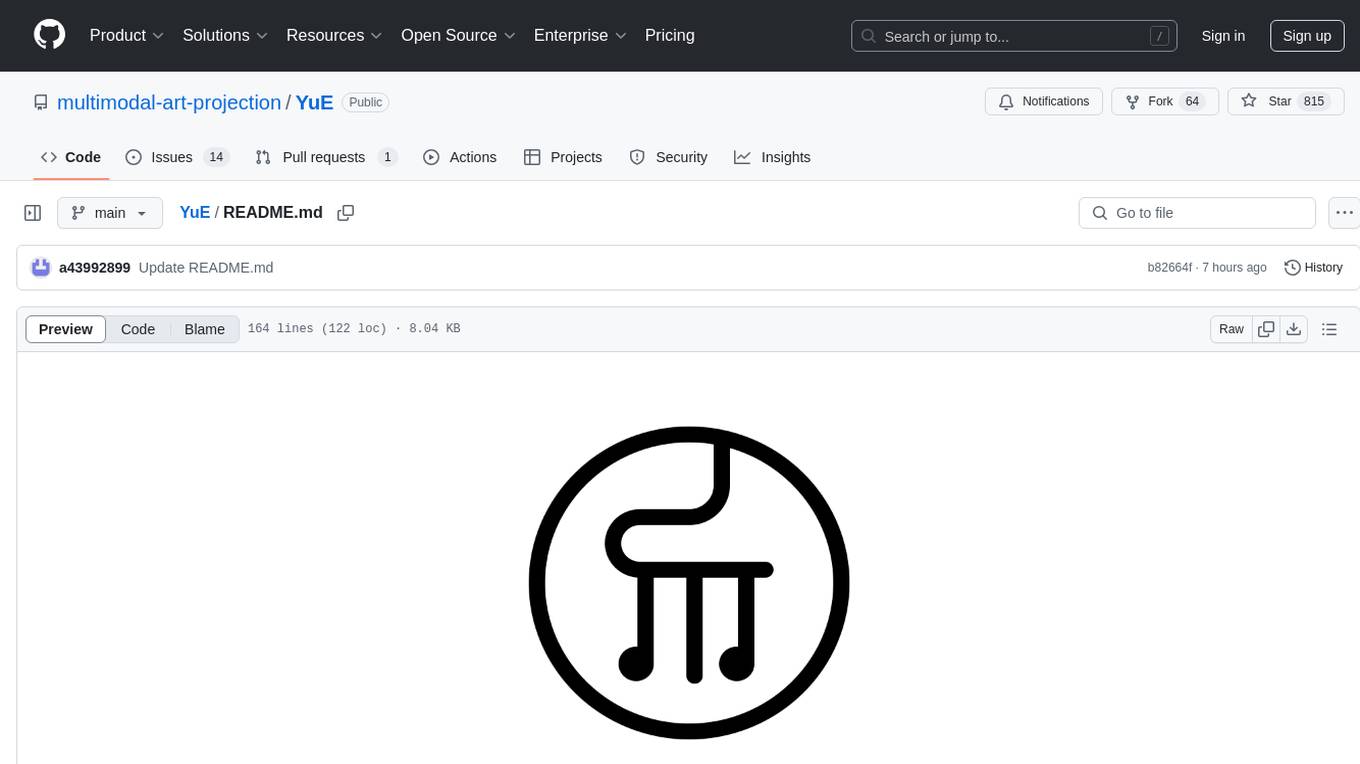
YuE
YuE (乐) is an open-source foundation model designed for music generation, specifically transforming lyrics into full songs. It can generate complete songs in various genres and vocal styles, ensuring a polished and cohesive result. The model requires significant GPU memory for generating long sequences and recommends specific configurations for optimal performance. Users can customize the number of sessions for memory usage. The tool provides a quickstart guide for generating music using Transformers and includes tips for execution time and tag selection. The project is licensed under Creative Commons Attribution Non Commercial 4.0.
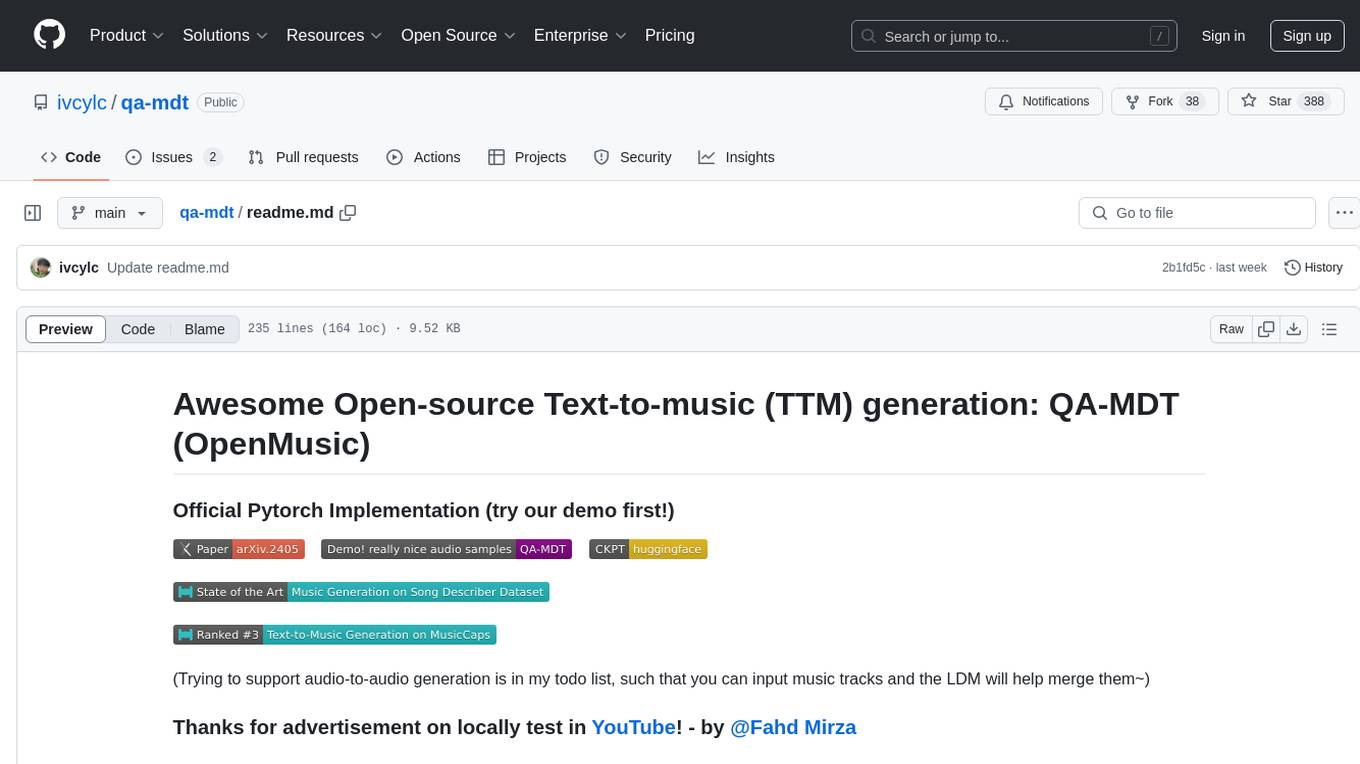
qa-mdt
This repository provides an implementation of QA-MDT, integrating state-of-the-art models for music generation. It offers a Quality-Aware Masked Diffusion Transformer for enhanced music generation. The code is based on various repositories like AudioLDM, PixArt-alpha, MDT, AudioMAE, and Open-Sora. The implementation allows for training and fine-tuning the model with different strategies and datasets. The repository also includes instructions for preparing datasets in LMDB format and provides a script for creating a toy LMDB dataset. The model can be used for music generation tasks, with a focus on quality injection to enhance the musicality of generated music.
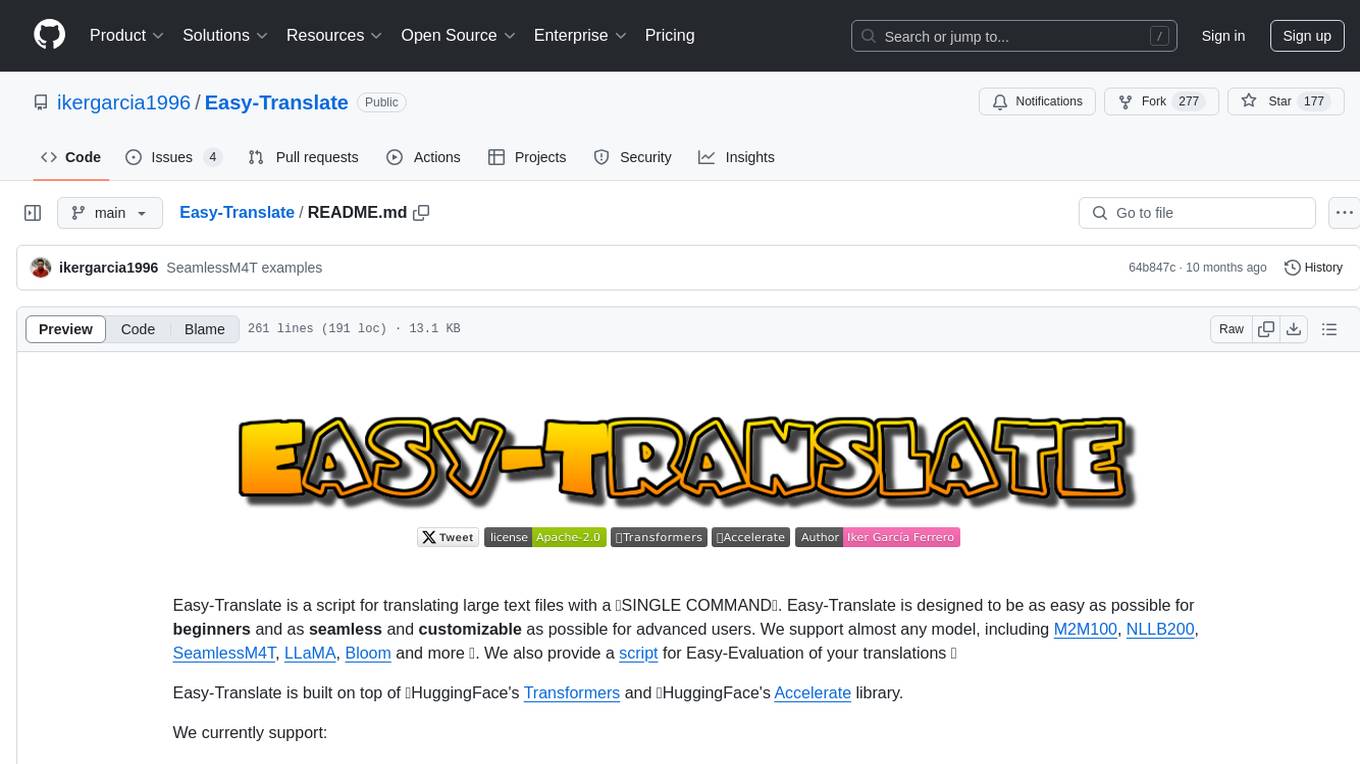
Easy-Translate
Easy-Translate is a script designed for translating large text files with a single command. It supports various models like M2M100, NLLB200, SeamlessM4T, LLaMA, and Bloom. The tool is beginner-friendly and offers seamless and customizable features for advanced users. It allows acceleration on CPU, multi-CPU, GPU, multi-GPU, and TPU, with support for different precisions and decoding strategies. Easy-Translate also provides an evaluation script for translations. Built on HuggingFace's Transformers and Accelerate library, it supports prompt usage and loading huge models efficiently.
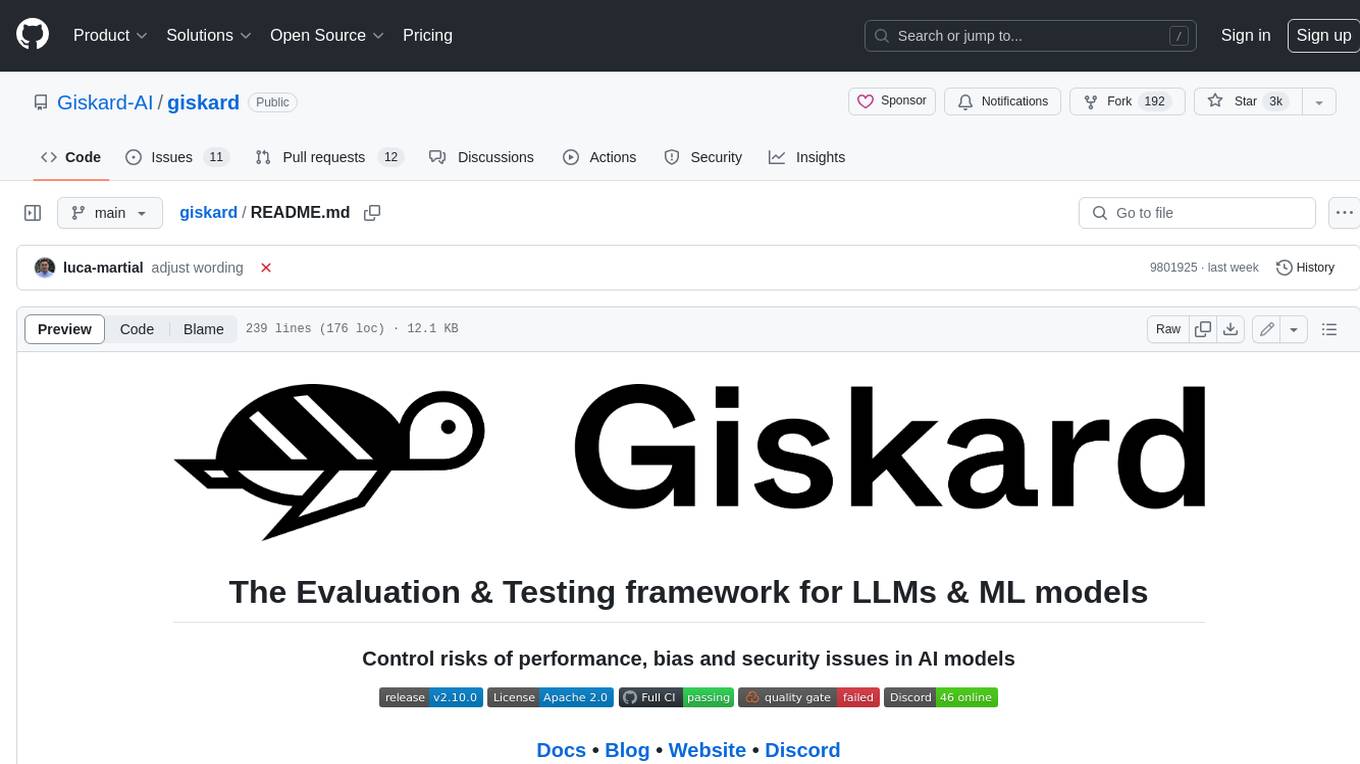
giskard
Giskard is an open-source Python library that automatically detects performance, bias & security issues in AI applications. The library covers LLM-based applications such as RAG agents, all the way to traditional ML models for tabular data.
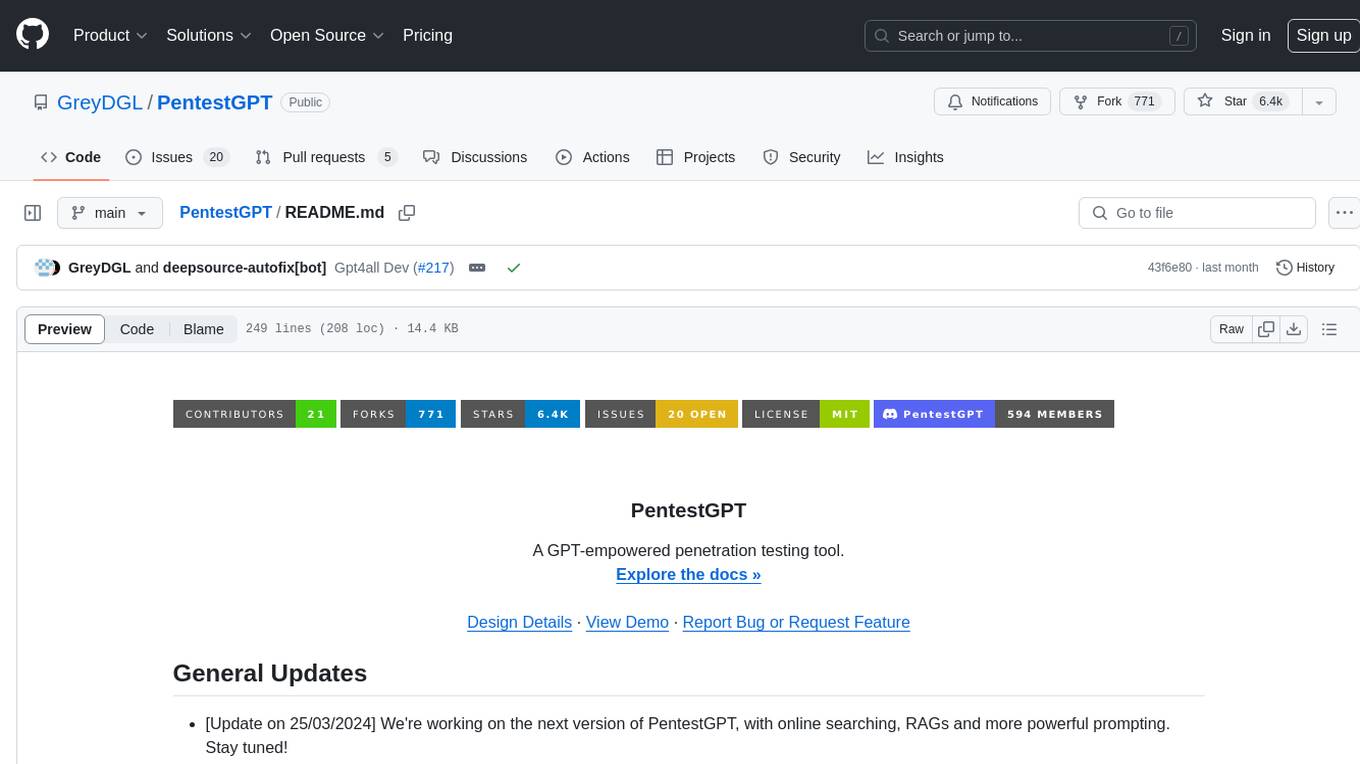
PentestGPT
PentestGPT is a penetration testing tool empowered by ChatGPT, designed to automate the penetration testing process. It operates interactively to guide penetration testers in overall progress and specific operations. The tool supports solving easy to medium HackTheBox machines and other CTF challenges. Users can use PentestGPT to perform tasks like testing connections, using different reasoning models, discussing with the tool, searching on Google, and generating reports. It also supports local LLMs with custom parsers for advanced users.
For similar tasks

obsidian-arcana
Arcana is a plugin for Obsidian that offers a collection of AI-powered tools inspired by famous historical figures to enhance creativity and productivity. It includes tools for conversation, text-to-speech transcription, speech-to-text replies, metadata markup, text generation, file moving, flashcard generation, auto tagging, and note naming. Users can interact with these tools using the command palette and sidebar views, with an OpenAI API key required for usage. The plugin aims to assist users in various note-taking and knowledge management tasks within the Obsidian vault environment.
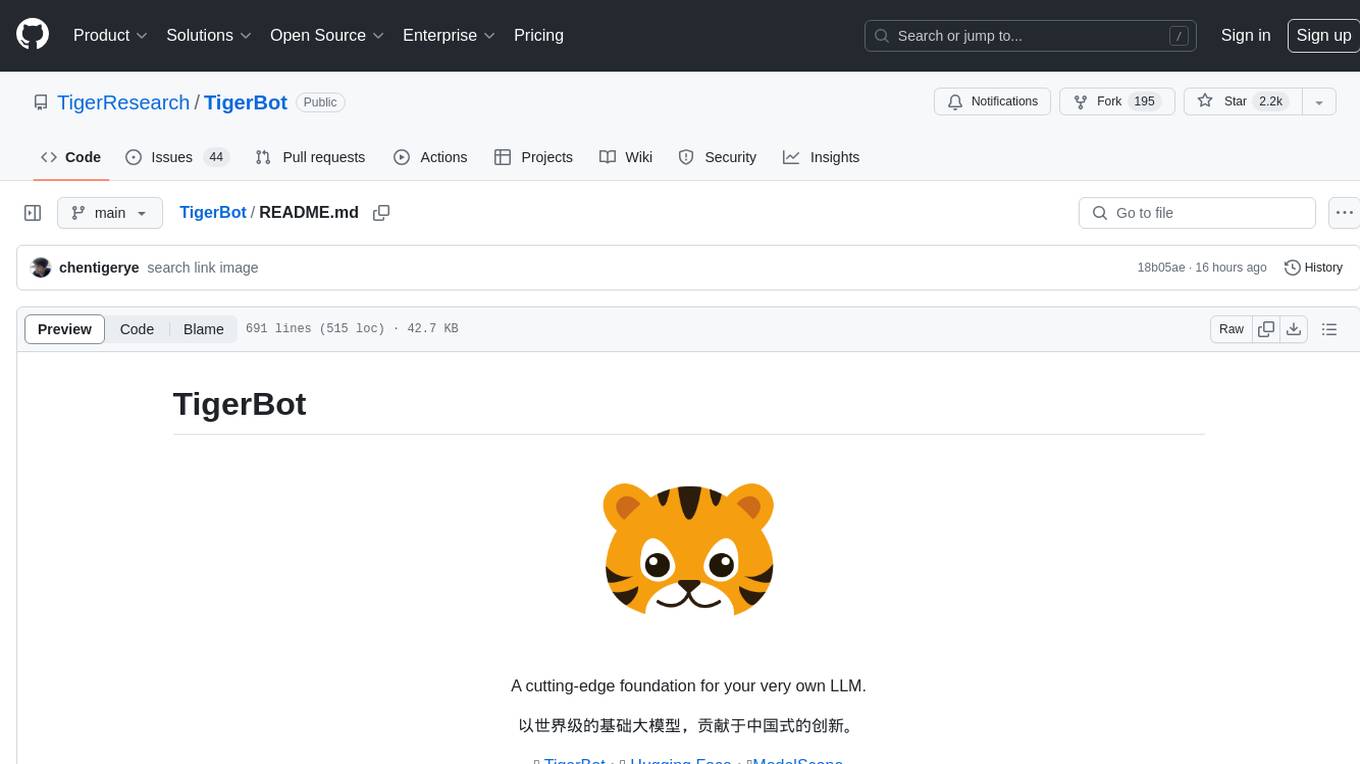
TigerBot
TigerBot is a cutting-edge foundation for your very own LLM, providing a world-class large model for innovative Chinese-style contributions. It offers various upgrades and features, such as search mode enhancements, support for large context lengths, and the ability to play text-based games. TigerBot is suitable for prompt-based game engine development, interactive game design, and real-time feedback for playable games.
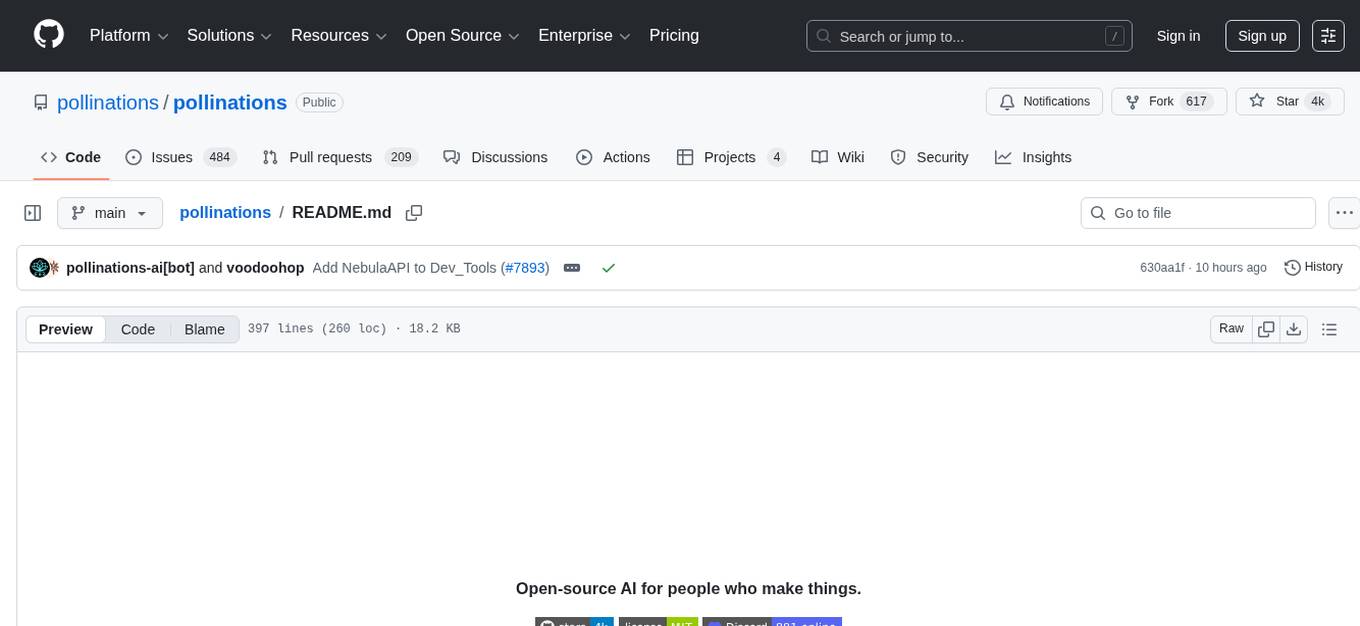
pollinations
pollinations.ai is an open-source generative AI platform based in Berlin, empowering community projects with accessible text, image, video, and audio generation APIs. It offers a unified API endpoint for various AI generation needs, including text, images, audio, and video. The platform provides features like image generation using models such as Flux, GPT Image, Seedream, and Kontext, video generation with Seedance and Veo, and audio generation with text-to-speech and speech-to-text capabilities. Users can access the platform through a web interface or API, and authentication is managed through API keys. The platform is community-driven, transparent, and ethical, aiming to make AI technology open, accessible, and interconnected while fostering innovation and responsible development.
For similar jobs

LLMStack
LLMStack is a no-code platform for building generative AI agents, workflows, and chatbots. It allows users to connect their own data, internal tools, and GPT-powered models without any coding experience. LLMStack can be deployed to the cloud or on-premise and can be accessed via HTTP API or triggered from Slack or Discord.

daily-poetry-image
Daily Chinese ancient poetry and AI-generated images powered by Bing DALL-E-3. GitHub Action triggers the process automatically. Poetry is provided by Today's Poem API. The website is built with Astro.

exif-photo-blog
EXIF Photo Blog is a full-stack photo blog application built with Next.js, Vercel, and Postgres. It features built-in authentication, photo upload with EXIF extraction, photo organization by tag, infinite scroll, light/dark mode, automatic OG image generation, a CMD-K menu with photo search, experimental support for AI-generated descriptions, and support for Fujifilm simulations. The application is easy to deploy to Vercel with just a few clicks and can be customized with a variety of environment variables.

SillyTavern
SillyTavern is a user interface you can install on your computer (and Android phones) that allows you to interact with text generation AIs and chat/roleplay with characters you or the community create. SillyTavern is a fork of TavernAI 1.2.8 which is under more active development and has added many major features. At this point, they can be thought of as completely independent programs.

Twitter-Insight-LLM
This project enables you to fetch liked tweets from Twitter (using Selenium), save it to JSON and Excel files, and perform initial data analysis and image captions. This is part of the initial steps for a larger personal project involving Large Language Models (LLMs).

AISuperDomain
Aila Desktop Application is a powerful tool that integrates multiple leading AI models into a single desktop application. It allows users to interact with various AI models simultaneously, providing diverse responses and insights to their inquiries. With its user-friendly interface and customizable features, Aila empowers users to engage with AI seamlessly and efficiently. Whether you're a researcher, student, or professional, Aila can enhance your AI interactions and streamline your workflow.

ChatGPT-On-CS
This project is an intelligent dialogue customer service tool based on a large model, which supports access to platforms such as WeChat, Qianniu, Bilibili, Douyin Enterprise, Douyin, Doudian, Weibo chat, Xiaohongshu professional account operation, Xiaohongshu, Zhihu, etc. You can choose GPT3.5/GPT4.0/ Lazy Treasure Box (more platforms will be supported in the future), which can process text, voice and pictures, and access external resources such as operating systems and the Internet through plug-ins, and support enterprise AI applications customized based on their own knowledge base.

obs-localvocal
LocalVocal is a live-streaming AI assistant plugin for OBS that allows you to transcribe audio speech into text and perform various language processing functions on the text using AI / LLMs (Large Language Models). It's privacy-first, with all data staying on your machine, and requires no GPU, cloud costs, network, or downtime.













